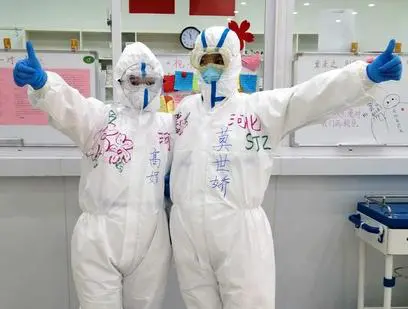On what is supposed to be a day to take a break and celebrate, women on the front lines of the fight against the novel coronavirus outbreak in China have been busier than ever.
March 8 is International Women's Day, a chance for men to honor their female partners for their contributions to the families and society. And this year, the celebration takes on special significance.
A SICK NOTE NEVER USED
Zhang Jian, 37, as usual, put on a red vest and a mask early in the morning and began her daily inspection in a community in north China's Tianjin Municipality.
She works at least six hours a day, from distributing leaflets with epidemic prevention information, taking temperatures of local residents and conducting disinfection of the community of over 2,600 households.
Zhang is a cancer patient. She suffered from breast cancer with axillary lymph node metastasis in 2017 and still needs to take pills and get an injection every month due to her mastectomy.
Worried about her physical condition, her husband got her a 30-day sick note but Zhang had no time to take even a single day off. She had been working for over 40 days in a row.
"Everyone is overloaded. If I ask for leave, my colleagues will be stressed out," she said.
There are only nine workers in the community, each taking care of about 300 households. They also take turns with eight other personnel to work as "gatekeepers" to register the movements of vehicles and personnel in the community.
Zhang said that grid-based workers have built the first line of defense against the coronavirus. "To protect local residents is to defend ourselves. I will stick it out," she said.
"Some residents have given us cakes, umbrellas and porridge as a token of appreciation, which warms us from the winter cold," said Zhang.
ENDLESS INCOMING CALLS
Zhang Ying, 45, has been on duty around the clock over the past month. As a psychological consultant, her soft tone has soothed many that encounter stress or depression amid the epidemic.
"Psychological assistance is a placebo for those suffering from mental stress. And our hotline is like a life-saving straw that can help ease panic and make them feel secure," said Zhang Ying.
Once a man called and burst into tears for over 20 minutes, worrying about his wife being diagnosed as a suspected COVID-19 patient. She quietly listened to him vent his emotions and offered him psychological guidance. The man eventually calmed down.
The man rung again about two weeks later to express his gratitude, saying that it was the call that had helped him pull through.
Zhang Ying sometimes receives over 20 calls a day. The inquirers include parents and children of frontline medics, confirmed COVID-19 patients, and close contacts under quarantine.
"Negative emotion may cause more serious consequences than the epidemic. I will try my best to help people fight against the coronavirus with my expertise," said Zhang Ying.
AN UNUSUAL HONEYMOON
Twenty-eight-year-old Cui Mengwei's battlefield is in the lab. She is a laboratory technician of the Center for Disease Control and Prevention of Hexi District in Tianjin.
Though not on the front line of medical treatment, Cui's work is extraordinarily crucial in the treatment of a patient as rapid and effective screening of nucleic acid samples can help win precious time for the treatment of patients and medical isolation of close contacts.
She works with the virus for four to five hours every day with a heavy hazmat suit and medical goggles. Her face is left with blood-red marks after a day's work and she often has to put the outfit on again before the marks have faded.
Cui just got married in January, and the couple had planned to celebrate the Spring Festival in her husband's hometown Beijing, a Chinese tradition. But she canceled the plan and threw herself in the lab after the novel coronavirus outbreak.
"I look so handsome, Mom, don't I? Can you tell which one is me?" She once texted her mother a photo of herself with her colleagues at work. "Of course I can," her mother replied over the phone, in a broken voice.
Cui's husband also stayed to accompany his bride. On a snowy night, when Cui finally got off work at 4 a.m., she found her partner snoring inside the car covered with thick snow.
"I arrived at 1 o'clock and had a good sleep already," he smiled.
"I was deeply moved and felt very sorry," she said. "Many of my colleagues are women of the same age as me, all of them are responsible and passionate youngsters," said Cui.
(CGTN)
 简体中文
简体中文





